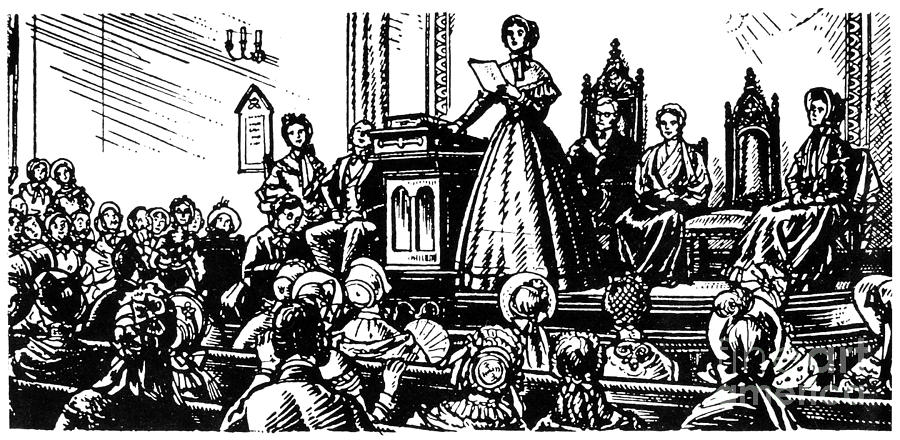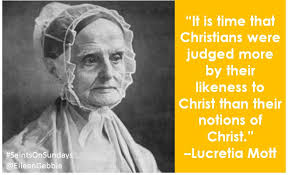In everything I showed you that by working hard in this manner you must help the weak and remember the words of the Lord Jesus, that He Himself said, “It is more blessed to give than to receive.” (Acts 20:35)
At the Wesleyan chapel in Seneca Falls, N.Y. in 1848, 200 women gathered to hear Elizabeth Cady Stanton read the “Declaration of Sentiments and Grievances”. This was a paper that she wrote modeled on the Declaration of Independence calling for the just treatment of women.
Understanding that God created both men and women in His image, the preamble to their resolutions began, “We hold these truths to be self-evident: that all men and women are created equal; that they are endowed by their Creator with certain inalienable rights…” Over the last 167 years things have changed for women. Women are no longer barred from getting an education, voting, fair wages, or control of their own money. These things are in thanks to many women who struggled for fair treatment of women, and Lucretia Mott was one of the earliest.
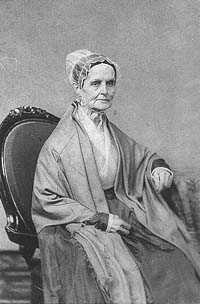 Lucretia Mott is still known today as a gifted and wise woman. Her sayings are quoted by many. Lucretia was strongly opposed to slavery, unfair treatment of women, and hypocrisy in religion. She was ahead of her time as an advocate for any of the disenfranchised in America including blacks, both slave and free, women, and the American Indians.
Lucretia Mott is still known today as a gifted and wise woman. Her sayings are quoted by many. Lucretia was strongly opposed to slavery, unfair treatment of women, and hypocrisy in religion. She was ahead of her time as an advocate for any of the disenfranchised in America including blacks, both slave and free, women, and the American Indians.
Lucretia Coffin Mott was born January 3, 1793 on Nantucket Island, Massachusetts, the second of five children. Her parents, Thomas Coffin, Jr. and Anna Folger Coffin were members of the Society of Friends, also known as Quakers. One of the tenets of the Quakers is the essential equality of men and women. Having a strong understanding of the value and abilities of women, Thomas Coffin would see to it that his daughters were educated.
Thomas Coffin was a ship captain who could often be at sea for up to two years. Once when he was gone a long time, and feared lost, Anna Coffin became a shopkeeper to support herself and her children. Other women on Nantucket Island ran businesses to keep going while the men were away. The success of the women was proof that women were as capable as men of managing a business. This is the environment that Lucretia grew up in.
Early in life Lucretia became aware of the cruelty of slavery. She attended a Quaker boarding school at Nine  Partners in New York. Her teacher, Susan Marriott, endeavored to instruct the children about the horrors of slavery. There were pictures on the classroom walls depicting the Africans in the holds of ships. Lucretia also read an account of the horrors of slavery as described by Thomas Clarkson, an English abolitionist, that was part of the school reader titled, “Mental Improvement”. These things shaped Lucretia’s life as she became one of the leading abolitionists of her time.
Partners in New York. Her teacher, Susan Marriott, endeavored to instruct the children about the horrors of slavery. There were pictures on the classroom walls depicting the Africans in the holds of ships. Lucretia also read an account of the horrors of slavery as described by Thomas Clarkson, an English abolitionist, that was part of the school reader titled, “Mental Improvement”. These things shaped Lucretia’s life as she became one of the leading abolitionists of her time.
 After two years of schooling, Lucretia stayed on at the boarding school for an extra year to teach. While she was there she noticed that the male teachers were paid more than twice as much as the females. This rankled Lucretia and again she filed the information away in her mind until a time when she would do something about it.
After two years of schooling, Lucretia stayed on at the boarding school for an extra year to teach. While she was there she noticed that the male teachers were paid more than twice as much as the females. This rankled Lucretia and again she filed the information away in her mind until a time when she would do something about it.
While at the school, Lucretia met her future husband James Mott. At the end of her teaching year, Lucretia returned home. Her father was starting up a new business. Lucretia was missing her friend James and asked her father if he could use a good clerk. Her father quickly sized up the situation and approached James. In a few months James went to work at the Coffin’s store. In 1811, James and Lucretia married and lived in Philadelphia.
Lucretia and James had six children. One son, Thomas died as a child from a fever, but the four girls and another Thomas survived until adulthood. In 1815 Thomas Coffin died leaving the family in debt. He had signed a note for someone whose business failed not too long before he died. This meant that the Coffin’s were responsible. Undaunted, Anna Coffin started a business. Soon she was successfully taking care of her family again. Lucretia and her sister taught school to help out.
James Mott worked at a variety of businesses. He and Lucretia had made a vow to boycott products made by slaves. So James stopped selling goods made from cotton and worked in the wool industry instead.
The Meetings of the Society of Friends are somewhat different than what most of us experience in a typical Protestant church. At the Meetings the people sit silently until someone feels led by the Holy Spirit to speak. The listeners can follow up with comments or prayer.
A short time after three-year-old Thomas died, Lucretia offered a modest prayer at the Meeting. This was followed up many times and by 1821 she was recognized as a gifted speaker. The Society of Friends approved her as a minister and she became a regular preacher.
At this time the Quakers were experiencing some inner organizational struggles. Two factions eventually formed, one that was moving toward the ways of the other Protestants, and the HIcksites, named after Elias Hicks who called for the simple piety of the original Friends and their dependence on the “inner light” for counseling. After much prayer and soul-searching James and Lucretia joined the Hicksites.
Lucretia continued to preach but after seeing how the two factions split over doctrine she decided to study the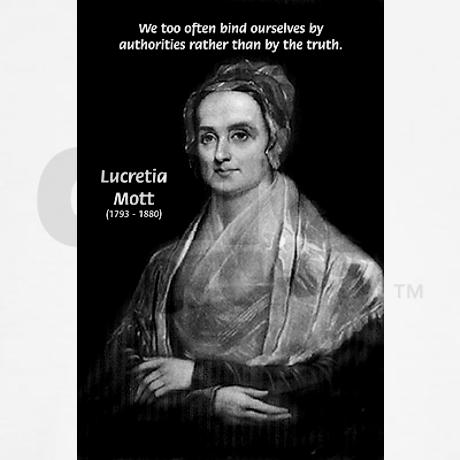 tenets of the faith for herself. She no longer accepted things blindly. As she studied she slowly came to some conclusions. “Loving God was meaningless unless one also loved men – and this included strangers as well as friends. For only he that doeth right is righteous,” she concluded. This is the third area of life in which Lucretia became well known – a religious reformer. Lucretia was concerned that people would “practice what they preach” in their faith. She was not afraid to criticize leaders who didn’t.
tenets of the faith for herself. She no longer accepted things blindly. As she studied she slowly came to some conclusions. “Loving God was meaningless unless one also loved men – and this included strangers as well as friends. For only he that doeth right is righteous,” she concluded. This is the third area of life in which Lucretia became well known – a religious reformer. Lucretia was concerned that people would “practice what they preach” in their faith. She was not afraid to criticize leaders who didn’t.
During all of the years of her activism Lucretia was a good wife and mother. Her husband and children came first. She was so gifted and organized that she was able to run her household well while finding time for reading and her many projects.
Lucretia worked with Elizabeth Cady Stanton to put on the first annual women’s rights convention in Seneca Falls, New York in 1848. As the first time that so many women gathered to ask for equal rights it caused quite a controversy.
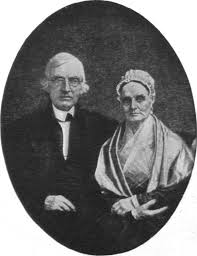
Among her many other accomplishments was the founding of Swarthmore College first chartered in 1864. James and Lucretia insisted that it be a coeducational college.
James Mott died in 1868. Lucretia sorrowed heavily but continued to work hard for the cause of the disadvantaged. Lucretia joined with Elizabeth Cady Stanton and Susan B. Anthony to form the National Woman Suffrage Association in 1869 in order to try and get an amendment to the federal constitution passed granting women the right to vote. None of these women would live to see the nineteenth amendment passed granting female suffrage but they laid the ground work that others brought to fruition.
While some women were speaking on the so-called moral superiority of women, Lucretia maintained that men and women were truly equal in all of their capacities, mental, spiritual, and moral. She worked for the day when laws would be reformed to grant women equal access to education, jobs, property rights, and control of their own money. Obtaining the right to vote was only a step on the way to changing the societal attitude toward women which left them as second-class citizens.
In 1878 at the age of 85 Lucretia attended the thirtieth anniversary of the first Seneca Falls convention. On November 11, 1880 she died in Chelton Hills, near Philadelphia, surrounded by her children and grandchildren. Many nineteenth and twentieth century reformers praise her as a woman ahead of her time, strongly advocating for the equal treatment of all of America’s citizens. We remain truly amazed at her courage for always standing up for what is right and can be very thankful for all of the freedoms that we now enjoy thanks to her diligence.
